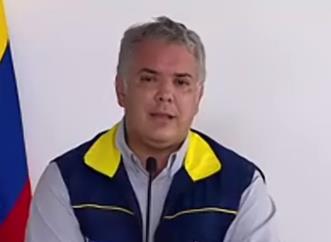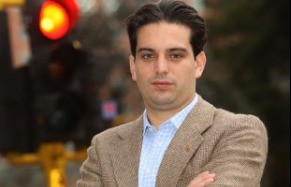The Politics Of Disaster Relief
After a 7.0 magnitude earthquake struck Haiti, the aftershock reached China in ways that few anticipated.The earthquake forced Chinese leaders to navigate the tricky politics of disaster relief.
A Daily Publication of The Dialogue
WASHINGTON—Strong Colombia-U.S. relations will continue regardless of future political changes in either country, Colombian President Iván Duque said Thursday during an online event hosted by the Inter-American Dialogue.
“We have strong appreciation for the bilateral, bicameral and bipartisan relations we have built with the United States,” Duque said from the Colombian island of San Andrés, where he is overseeing the government’s response to Hurricane Iota. Duque added that U.S. presidents and lawmakers of both parties have supported close ties between the two nations for many years.
During the administration of U.S. President Donald Trump, the United States and Colombia worked closely on areas such as supporting the Andean nation’s membership in the Organization for Economic Cooperation and Development, or OECD, as well as in combating terrorism and drug smuggling while boosting trade and investment, Duque said.
He also praised presumptive President-elect Joe Biden. “We value the support that President-elect Biden has given to Colombia over the last two decades,” Duque said, outlining Biden’s support for Plan Colombia, a joint government initiative designed to fight drug cartels and insurgent groups in the South American country. Biden was an advocate of the plan during his time as a U.S. senator.
“We will continue to work closely with the Biden-Harris administration,” Duque said. Among the issues at the forefront of U.S.-Colombia relations under a Biden presidency are expected to be the fight against terrorism and drug trafficking and increased trade and investment relations, as well as climate change and protection of the Amazon.
Another key issue for joint collaboration will be sustained efforts to “end the dictatorship” of Venezuelan President Nicolás Maduro, Duque said, adding that the focus should be on bipartisan U.S. support for Venezuelan opposition leader Juan Guaidó, whom Colombia, the United States and dozens of other countries recognize as Venezuela’s interim president. Duque also said continued sanctions as well as pressure by the international community are necessary to push Maduro to step down.
When asked about Colombia’s relationship with China against the backdrop of growing geopolitical tensions between the United States and the Asian nation, Duque said having China as a trade partner is important, not just for Colombia but for any country looking to widen export opportunities.
However, “when it comes to the Western Hemisphere and … the geopolitics based on principles, we have made a clear determination that has been a state policy for the last decades, [which is] that Colombia is the United States’ strongest ally in Latin America,” Duque said.
 The Latin America Advisor features Q&A from leaders in politics, economics, and finance every business day. It is available to members of the Dialogue’s Corporate Program and others by subscription.
The Latin America Advisor features Q&A from leaders in politics, economics, and finance every business day. It is available to members of the Dialogue’s Corporate Program and others by subscription.
After a 7.0 magnitude earthquake struck Haiti, the aftershock reached China in ways that few anticipated.The earthquake forced Chinese leaders to navigate the tricky politics of disaster relief.
Despite reports in recent months that Mexican manufacturing is experiencing a resurgence, Mexico’s industrial sector faces tremendous challenges.
With no time to lose, Colombia’s newly appointed Director of National Planning has gotten to work on an ambitious agenda.
 Duque // Photo: Inter-American Dialogue
Duque // Photo: Inter-American Dialogue
 Video
Video